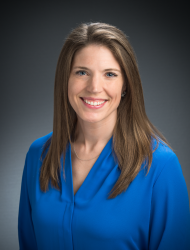Villanova Engineering Professor Receives CAREER Grant from the National Science Foundation

VILLANOVA, Pa. – A faculty member from Villanova University’s College of Engineering has been named a recipient of the Faculty Early Career Development (CAREER) Award from the National Science Foundation (NSF). The award will allow Kristin Sample-Lord, PhD, assistant professor of Civil and Environmental Engineering, to advance research in water security and environmental protection, while preparing future science, technology, engineering and mathematics (STEM) professionals. Her project, “Coupled Phenomena Resilience and Dynamics in Bentonite Barriers,” has received a five-year, $510,000 grant.
Sample-Lord is the ninth Villanova faculty member to receive an NSF CAREER Award since 2017 and the fourth from the College of Engineering. The CAREER Award is the most prestigious grant supporting career development activities for teacher-scholars who most effectively integrate research and education within the context of the mission of their organization.
“The research is as important as having safe drinking water and places to live,” said Sample-Lord. “All across the world we construct facilities to safely contain wastes and hazardous chemicals, but it is inevitable that they still leak to some degree. We’re trying to limit the extent to which that happens.”
A faculty member of the Civil and Environmental Engineering Department at Villanova since 2015, Sample-Lord is researching a clay called bentonite, a material used to protect industrial, municipal and radioactive waste from reaching water supplies and the environment. The grant will allow her to study the long-term effectiveness of these barriers under changing and intensifying environmental conditions they are likely to experience over their design life.
The award will also support educational mentorship and outreach for Villanova students and other visiting undergraduates, as well as middle and high school women/girls in STEM fields.
“We’ll be developing educational resources that will be shared internationally through the geoenvironmental community,” she said. “The undergrads from visiting universities are also going to be bringing these learned outreach activities back to their schools to create a compounding effect of impact.”
An expert in geotechnical and geoenvironmental engineering, Sample-Lord’s work has included performing experimental research in the laboratory and field to evaluate geotechnical solutions for containing waste, managing subsurface contamination, reusing recycled materials in infrastructure and managing stormwater through green approaches. This work has been funded by the NSF, PA Department of Environmental Protection and PA Department of Transportation. She is a core member of the Villanova Center for Resilient Water Systems and Vice President of the North American chapter of the International Geosynthesis Society. Dr. Sample-Lord’s industry experience includes providing geotechnical design for international mining and landfill projects. In academia, she has taught undergraduate courses in soil mechanics and geology, and graduate courses in geoenvironmental engineering and slope stability.
About Villanova University: Since 1842, Villanova University’s Augustinian Catholic intellectual tradition has been the cornerstone of an academic community in which students learn to think critically, act compassionately and succeed while serving others. There are more than 10,000 undergraduate, graduate and law students in the University's six colleges—the College of Liberal Arts and Sciences, the Villanova School of Business, the College of Engineering, the M. Louise Fitzpatrick College of Nursing, the College of Professional Studies and the Villanova University Charles Widger School of Law. Ranked among the nation’s top universities, Villanova supports its students’ intellectual growth and prepares them to become ethical leaders who create positive change everywhere life takes them. For more, visit www.villanova.edu.
